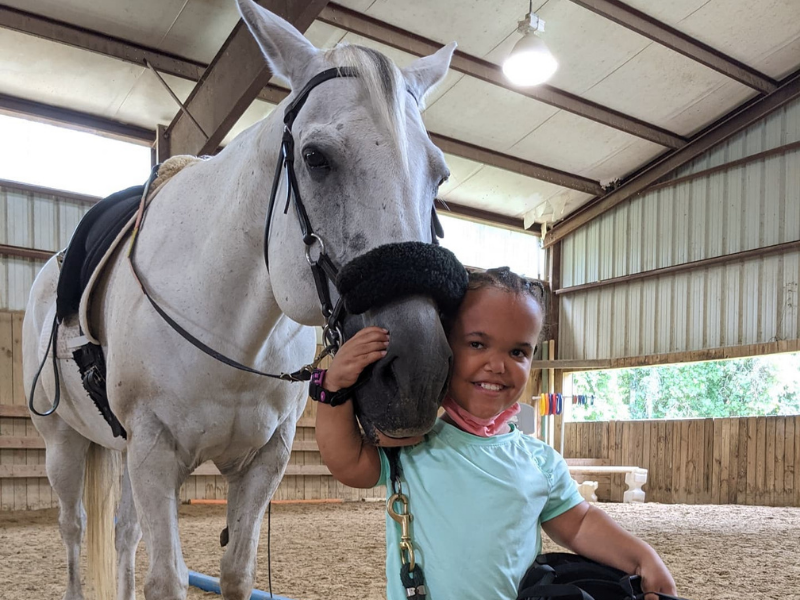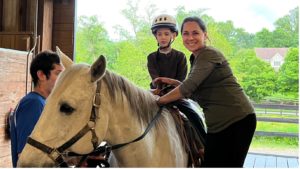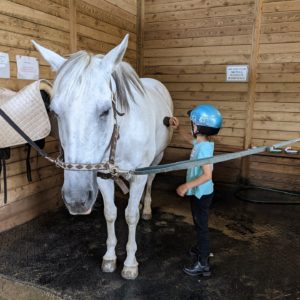How can therapeutic riding help kids?
“Horses can hear your heartbeat from about four feet away,” says Maya Grigorovich-Barsky, president of the Therapeutic Riding Association of Virginia, also known as TRAV. TRAV is a nonprofit organization on a mission to foster equine-assisted services and raise public awareness about the benefits of these services for individuals with disabilities. “What horses can also do,” adds Grigorovich-Barsky, “in the wild, they will synchronize their heartbeats to the other horses in the herd in order to sense danger more quickly, and recent studies have shown that they use those tactics in domesticated life as well. If you are calm and open, they can sync their heartbeat to match yours; this is how horses form special connections with humans.”
This unique ability of horses to connect with humans comes with benefits that horseback riders experience, especially children with disabilities. While horse riding offers everyone recreational opportunities to enjoy nature, it helps children with disabilities enjoy nature in ways that are not available for them otherwise. It also helps them to communicate nonverbally and feel empowered and accepted, in addition to offering therapeutic benefits.
Recreational Opportunities
Riding a horse gives a child with activity limitations the opportunity to enjoy nature freely, and because horseback riding is rhythmic, it can be very beneficial to the human body, says Grigorovich-Barsky, who studied special education before teaching horse riding with the LiftMeUp! program in Great Falls, Va. The hip motion that the horse causes our bodies to make while astride is very similar to walking, she explains. “For example, if somebody is a wheelchair user and they don’t get the natural ‘walk movement’ in their hips on a regular basis, riding a horse can be very beneficial on a number of levels.”
Horseback riding helps increase flexibility, encourages balance, helps improve muscle strength and improves coordination through the multitasking needed for effective communication with horses.
Communication
Vivian Fatovic used to take her three children to practice horse riding for recreational reasons. Only when she happened to pass by a sign that said “therapeutic riding” did she start to learn about equine-assisted therapy and how it could help her son Luka, who is diagnosed with autism. Observing how Luka interacts with horses is an eye-opening experience for Fatovic herself.
“It is not about how autistic people have to learn how to live in the typical world, but more [about how] typical people should be learning how to live in the autistic world, and there is not enough of that,” she stresses. “Communication is not only verbal. Animals have a way inherently to help my son understand that communication has different forms.”
When Luka spends time with horses, he does not feel pressured to communicate verbally, which he experiences on a regular basis in the typical world.
How to communicate with horses is part of the education offered by organizations providing equine-assisted services. Many of these organizations partner with professionals, including special education teachers and counselors, to develop academic skills, character, problem-solving and critical thinking. “We try to find out what the child is trying to learn in school, and if there are any trouble areas – say, for example, simple math problems – we can try and mimic real-life situations in the barn in a non classroom setting, in a setting that is fun, engaging and interactive,” says Grigorovich-Barsky.
Through communicating with horses, Luka learned how to focus and give instructions to horses looking to him for guidance. “What I think it does for Luka is empowerment. I think this is an important concept for a child who is in a more typical world and has difficulties functioning in that world,” says Fatovic.
Therapy
In addition to adaptive recreational opportunities and equine-assisted learning, equine-assisted service programs also provide therapeutic services such as hippotherapy. These services can only be provided in direct partnership with a licensed clinician such as a physical therapist, speech therapist, psychotherapist or occupational therapist. These services include:
- Hippotherapy: “Hippo” is a Latin word for horse, and hippotherapy is one form of equine-assisted therapy service. “We use horse riding to provide physical input for the rider. That stimulates and awakens their nervous system,” says Grigorovich-Barsky. “Fifteen to 20 minutes on a horse in a hippotherapy session at the walk can equate to about 1,500-2,500 neuromotor inputs into the rider’s nervous system. Clients wouldn’t necessarily get that kind of input if the horse was not involved.”
Hippotherapy can be focused on a number of different goals: - Physical Therapy: The physicality of horse riding can help improve and restore mobility and balance; it can relieve pain and reduce the need for surgical needs and even prescription drugs.
- Occupational Therapy: While physical therapy focuses on physicality, occupational therapy targets fine motor skills and the coordination of small muscles in movement with the eyes, hands and fingers.
Affordable Rates
To keep their services accessible, therapeutic riding programs have a price range similar to that of swimming or music lessons, according to Grigorovich-Barsky. Many also offer scholarships, and some insurance companies can cover the costs of certain services offered by these programs.
How to Find Equine-Assisted Service Programs
To find an accredited center near you, visit the Professional Association of Therapeutic Horsemanship’s website: pathintl.org/find-a-program. The website also allows you to search by various disabilities and other needs and by type of program, including summer camps.
Some Equine-Assisted Service Programs in the DMV
- Cloverleaf Equine Center (formerly Northern VA Therapeutic Riding) in Clifton, Va.
- LiftMeUp! in Great Falls, Va.
- Sprout Therapeutic Riding & Education Center in Aldie, Va.
- Rainbow Therapeutic Riding Center in Haymarket, Va.
- Simple Changes in Mason Neck, Va.
- Loudoun Therapeutic Riding in Lovettsville, Va.
- Maryland Therapeutic Riding in Crownsville, Md.
- Progressive Equestrian Therapeutic Services in Upper Marlboro, Md.
- Therapeutic & Recreational Riding Center, Inc. in Glenwood, Md.
- Great and Small Therapeutic Riding in Boyds, Md.
Related
Summer Activities for the Whole Family
Tips for Transitioning Children With Disabilities to Adulthood



